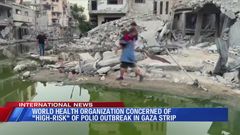Poliomyelitis, often called polio or infantile paralysis, is a infectious disease caused by the poliovirus. Approximately 90% to 95% of infections cause no symptoms. Another 5 to 10% of people have minor symptoms such as: fever, headache, vomiting, diarrhea, neck stiffness and pains in the arms and legs. These people are usually back to normal within one or two weeks. In about 0.5% of cases there is muscle weakness resulting in an inability to move. This can occur over a few hours to few days. The weakness most often involves the legs but may less commonly involve the muscles of the head, neck and diaphragm. Many but not all people fully recover. In those with muscle weakness about 2% to 5% of children and 15% to 30% of adults die. Years after recovery post-polio syndrome may occur, with a slow development of muscle weakness similar to what the person had during the initial infection. Poliovirus is usually spread from person to person through infected feces entering the mouth. It may also be spread by food or water containing human feces and less commonly from infected saliva. Those who are infected may spread the disease even if no symptoms are present for up to six weeks.

- WHO concerned about 'high-risk' of Polio outbreak in GAZA strip

- Parkersburg Rotary holding Race to End Polio







